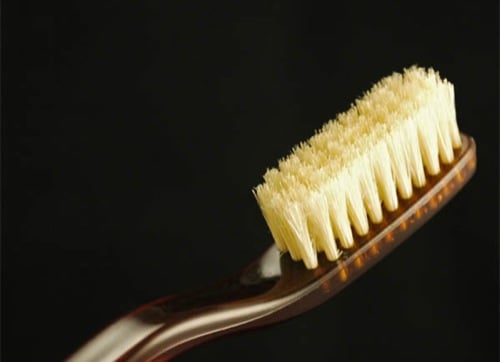Hard brushes do not adapt to the contour of the teeth and cannot clean efficiently. They are also too abrasive for the tissues of your teeth and gum. They basically take away more than the stains that many use them to remove. This is why they are rarely ever recommended by dentists for long-term use.
The hard toothbrush: gum destroyer
There are basically three ways that hard toothbrushes damage your gums:
- You avoid brushing your gum-line! This encourages plaque to form, which contains bacteria and this leads to gum inflammation (gingivitis). Gingivitis then progresses to more serious tooth support issues and you may eventually lose the teeth.
- You injure your gums! Hard brushes directly hurt your gums. They can also introduce bacteria into the bloodstream at dangerous levels, particularly if you have a predisposition to heart valve infection.
- You wear off the gum! Gingival recession happens to due direct injury to the gum, inflammation of the gum, or a combination of both. Unfortunately, the gums do not easily grow back if at all they ever do.
The hard toothbrush: Enamel destroyer
- You wear off the enamel, exposing the dentine, especially in the area just before the gum (cervical abrasion). In the areas of the neck of the tooth/root which are exposed by gingival recession, it further wears off the cementum, which is the layer covering the root of the teeth. These all result in making your teeth sensitive, starting with sensitivity to cold drinks or sugary stuff and cold air.
- Your teeth become more yellow! Yep. That is right. Prolonged use of a hard toothbrush will not make your teeth whiter. The simple reason is that the enamel is whitish in colour but translucent…so the more enamel that goes off, the more of the yellowish coloured dentine which lies underneath shows. Additionally, hard brushes can also leave the tooth surface rougher, making stains more likely to stay on.
- Your teeth are easily attacked. With the loss of the protective layer of the enamel, your teeth easily get damaged by hot and cold stimuli; acid from tooth decay-causing bacteria. Your teeth can also be easily broken.
What you need to do
One of the myths that people believe about dental care is that the harder you brush, the cleaner your tooth would be. It is therefore not so easy convincing yourself otherwise. So first of all, reassure yourself that a medium or soft toothbrush cleans just as well.
Armed with this information, kindly toss away all the hard toothbrushes that you have. Next, ensure you take your eyes off the massive display of hard toothbrushes that have flooded our markets.
Also, always make sure that you only buy recognised brands that actually give you the texture that they promise on the label. It is puzzling why some companies deceptively label their products soft or medium when they are actually hard.
Ola Asagba writes for Nene Dental Care
Copyright 2025 TheCable. All rights reserved. This material, and other digital content on this website, may not be reproduced, published, broadcast, rewritten or redistributed in whole or in part without prior express written permission from TheCable.
Follow us on twitter @Thecablestyle

